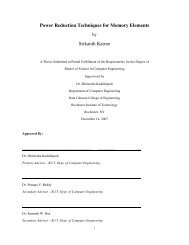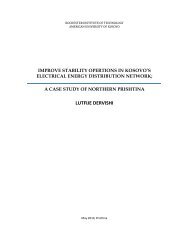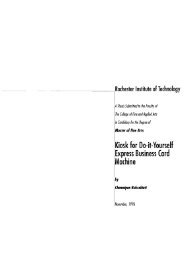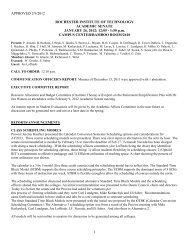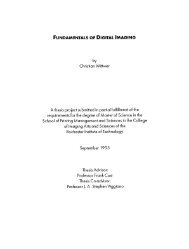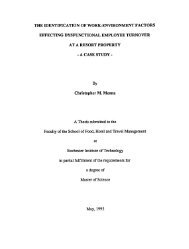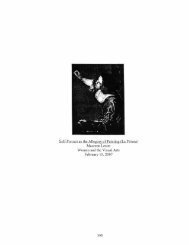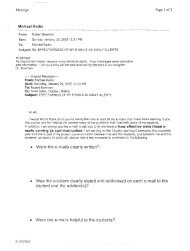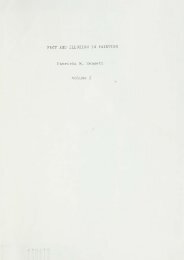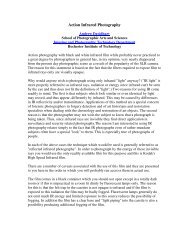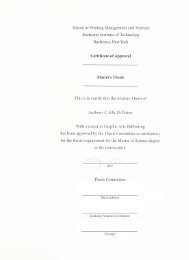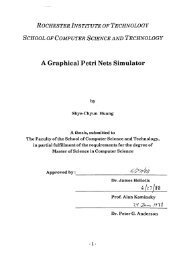Sophism and Moral Agnosticism, Or, How to Tell a Relativist from a ...
Sophism and Moral Agnosticism, Or, How to Tell a Relativist from a ...
Sophism and Moral Agnosticism, Or, How to Tell a Relativist from a ...
You also want an ePaper? Increase the reach of your titles
YUMPU automatically turns print PDFs into web optimized ePapers that Google loves.
I06 THE PLURALIST 6: I 20II<br />
13. All evidential claims regarding WMDs in Iraq prior <strong>to</strong> the 2003 invasion of U.S.<br />
forces have been thoroughly vetted <strong>and</strong> disproven. Consistent with the opinions of the<br />
majority ofUnited Nations member states, it is not difficult <strong>to</strong> make the case that the evidence<br />
was never strong. The evidence consisted in uncorroborated accouncs ofdefec<strong>to</strong>rs,<br />
nondescript satellite pho<strong>to</strong>s, <strong>and</strong> speculation regarding aluminum tubes, in contrast <strong>to</strong> the<br />
Department ofEnergy's expert opinion. An aggressive rhe<strong>to</strong>rical'campaign was necessary<br />
<strong>to</strong> sell the war against the lack of strong evidence. See "CNN Presents: Dead Wrong,"<br />
CNN.com, Zl Aug. 2005, <br />
14. See Talisse, "Teaching Pla<strong>to</strong>'s Euthyphro," 163-75.<br />
15. See Hamil<strong>to</strong>n <strong>and</strong> Cairns, "Euthyphro," CoLlected DiaLogues, 169-85.<br />
16. See Hamil<strong>to</strong>n <strong>and</strong> Cairns, "Socrates' Defense (Apology)," CoLLected DiaLogues,<br />
3-26 .<br />
17. This language is borrowed <strong>from</strong> Robert B. Talisse who has critiqued William Gals<strong>to</strong>n's<br />
approach <strong>to</strong> liberal pluralism by arguing that the undefended premise "coercion<br />
dem<strong>and</strong>s justification" is enthymematic <strong>to</strong> liberalism, which in part, on Talisse's account,<br />
renders liberalism circularly comprehensive. See Gals<strong>to</strong>n, liberaL PLuralism; <strong>and</strong> Talisse,<br />
"Can Value Pluralists."<br />
18. Stephen Toulmin describes the trend in philosophy, since the Enlightenment, of<br />
increasing dem<strong>and</strong> for rational certainty, in contrast <strong>to</strong> the reasoned embrace of uncertainty<br />
identified with Montaigne <strong>and</strong> classical skeptics. Toulmin identifies such writers<br />
wirh the insight "[t]hat we can know nothing about the world ofexperience wirh complete<br />
certainty, <strong>and</strong> that any attempt <strong>to</strong> prove the superiority of one abstract, universal<br />
doctrine over its rivals is a product of human presumptuousness." See Toulmin 196.<br />
19. See Political Liberalism, Lecture II, sec. 1-2, 48-58. As Rawls points out, the distinction<br />
between the reasonable <strong>and</strong> the rarional can be traced <strong>to</strong> Kant's distinction<br />
berween the categorical <strong>and</strong> the hyporhetical imperatives. (See Kant's Groundwork ofthe<br />
Metaphysics.) Rawls interprets the categorical imperative as representing pure practical<br />
reason <strong>and</strong> the hypothetical imperative representing empirical practical reasoning. In<br />
Rawls's own use ofthe distinction berween the rational <strong>and</strong> the reasonable, he maintains<br />
a more restricted political sense ofjustice in which reasonability involves a willingness <strong>to</strong><br />
identify fair terms ofcooperation <strong>and</strong> the recognition of rational fallibility. See footnote<br />
1 in Political Liberalism 48-49. For further discussion of the concepts of the rational <strong>and</strong><br />
the reasonable, see Sibley.<br />
20. The spirit of <strong>to</strong>leration as a hallmark of liberal philosophy is perhaps most eloquently<br />
represented in the writings ofVoltaire. See Voltaire.<br />
21. See Talisse, "Can Value Pluralists."<br />
22. Take, for example, MacIntyre's identification with the Enlightenment hope of<br />
discovering a categorically justifiable moral system, <strong>and</strong> his subsequent judgment that<br />
Enlightenment morality has failed in the absence ofsuch a system.<br />
23. See Cicero's Academica, trans. Rackham.<br />
24. See Reale, His<strong>to</strong>ry, ed. <strong>and</strong> trans. Ca<strong>to</strong>n, Vol. III.<br />
25. For instance, according <strong>to</strong> the wridngs ofSextus Empiricus (early second, late third<br />
century), the Greek skeptic Agrippa (late first century) is credited with the formulation<br />
offive grounds ofdoubt, which were vastly inAuential among Ancient Skeptics. Agrippa's<br />
first trope concerns what Rawls refers <strong>to</strong> as "burdens ofjudgment": (1) For any question,<br />
a variety of contradic<strong>to</strong>ry opinions may be put forth based on confused <strong>and</strong> uncertain<br />
evidence. Both senses <strong>and</strong> reasoning may be fallible, <strong>and</strong> our judgments may be confused



